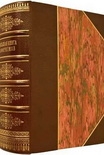Gluck by Diana Souhami (most interesting books to read .TXT) 📗

- Author: Diana Souhami
Book online «Gluck by Diana Souhami (most interesting books to read .TXT) 📗». Author Diana Souhami
In their early years they were educated at home in the schoolroom. The only other children they mixed with were their multitudinous cousins. Gluck and her brother were extremely close, and remained so until their father’s death, but they were strong rivals and, according to their mother, quarrelsome and naughty. A Swiss governess taught them French and a Sarah Solomons indoctrinated them in the tenets of the Jewish faith from a red-bound book by Mrs Philip Cohen called Bible Readings with My Children, inscribed with the epigraph ‘Even a child is known by his doings, whether his work be pure, whether it be right.’
Gluck described the family home as full of blue ornaments, diarrhoeacoloured oak, endless games of bridge and her father cheating at patience. She did, though, regard her childhood as happy. As for her latent taste for crossdressing, her brother remembered her intense annoyance at being given a Red Cross nurse’s outfit at the time of the Boer War, when he got a City Imperial Volunteers uniform with slouch hat, bandolier, leather leggings and gun. She freely admitted to a preference for games where she was Napoleon, and in her teens was commended in the Hampstead and St John’s Wood Advertiser for her ‘dignified and impressive’ performance as Cardinal Wolsey in scenes from Henry VIII at Miss Mathilde Ellis’s Pupils’ Recital at the Hampstead Conservatoire. As that same evening Ruby Greenop played Romeo, and Beatrice Cohen was William III, gender crossing probably reflects more on the surfeit of girls at Miss Ellis’s dramatic society, than as a reliable indicator of androgyny. Two years later, a play Gluck wrote called King and Pope was produced at the same Conservatoire. It ran to three mercifully short acts and a prologue and was set in eleventh-century Germany. She played Henry IV, her brother the Prince, her cousins Isidore and Barnett the Pope and the Bishop, and Sadie Cohen the lady-in-waiting.
The role of lady of the house was not enough for Francesca Gluckstein. She was an ambitious, energetic woman with little interest in home crafts, fashion, or the restricting demands of infant nurture. Anyway there were domestic staff in abundance: parlour maids, cooks, a nanny, a governess, a butler, a coachman, a groom. In adult life Gluck’s relationship with her servants was frequently terrible. She hired and fired legions of them, with repeated emotional showdowns, until she found a few, prepared out of loyalty and affection to go beyond any job description and cater to her demands.
Because Mrs Gluckstein, The Meteor, could not, given the status of her marriage, do paid work, she channelled her formidable energy into ‘the service of the poor’. An article about her in a Belgian paper in 1930 called her ‘La Reine des Mendiants’ – the Queen of the Beggars. ‘My husband and family lectured me on the subject of overwork continually. They said I was never to be found when wanted as I worked in the East End and slept in the West.’6 Her persistence in the art of extracting money for charitable causes became a family joke. The rich were said to reach for their cheque books with a sigh when they saw her coming.
Her main activity was fund-raising. She worked for the Jewish Board of Guardians, The Home for the Deaf, The Home for Incurables, The National Council for the Unmarried Mother and Her Child, the Young Women’s Christian Association, the Jewish Society for the Protection of Women and Girls, the City of London Maternity Hospital, the Deaf and Dumb Home, Wandsworth, the Roseneath Home for Women and Girls at Broadstairs. During the First World War, while her son was serving as an officer in Italy and Gluck was causing utter consternation, particularly to her father, by dressing in men’s clothes, living with her lesbian lover and painting portraits in a damp studio in Earl’s Court, The Meteor worked tirelessly for Belgian refugees. She arranged the furnishing of houses for them and the buying and distribution of clothing. She was awarded both an MBE and the Order of Queen Elizabeth of Belgium for this work. After the war she became a Justice of the Peace and was one of the first women magistrates. Yvonne Mitchell, in The Family, suggested that in later life she became so garrulous that a full day’s business could not be got through when she was in court. Perhaps that was fiction. Certainly she was talkative. And both of her children inherited her daunting energy and quality of persistence for the sake of a cause.
She had little interest in spending the money her husband’s family so energetically accumulated – except for the benefit of the poor. The Family code dictated with rigid fairness that all wives, after twenty-five years of marriage, should receive a necklace of pearls. The Meteor thought the extravagance needless and wanted the money diverted to something nobler. As flouting family convention was frowned on, she agreed to wear a string of imitation pearls. These broke at a casino in Monte Carlo and, as staff grovelled the floor and asked how many there were, she said she did not know and that anyway they were false – a statement which was not believed. She gave the money meant for the real pearls, a thousand pounds, to Queen Mary’s Maternity Home and earned herself Royal gratitude that was beyond price:
After I had the pleasure of seeing you this morning I at once handed to The Queen the magnificent donation.… Her Majesty desires me to tell you how keenly she appreciates the great interest you have taken in the welfare of her Maternity Home.… I need not assure you what great pleasure this large donation to her Home has given to The Queen.7
After five years of marriage The Meteor endured the first of a series of what





Comments (0)